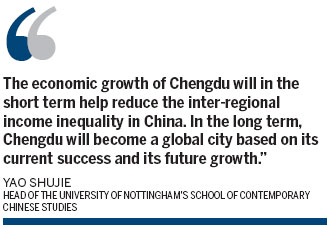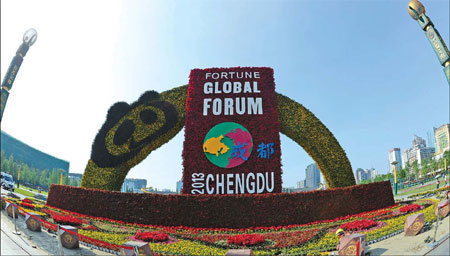Sichuan capital to Benefit as investors look inland
Updated: 2013-06-06 08:02
By Cecily Liu (China Daily)
|
||||||||
|
Come for the forum, stay for pandas A festive atmosphere prevails in Chengdu, with the 12th Fortune Global Forum set to open today. Around 600 participants have confirmed their attendance, including the CEOs of many Fortune Global 500 companies and other business leaders as well as former government officials, heads of state and economic experts. The event will focus on such issues as sustainable development, technological innovation, the global financial crisis and economic recovery. Cheng Qiling / Chengdu Economic Daily |
With costs rising on the coast, businesses are taking their money west, Cecily Liu reports
Chengdu's growth is a crucial part of China's transition from an export-oriented economy to one based on consumption and knowledge, economists in Europe said.
They say that rising production costs on the coast are prompting investors to look for opportunities inland. Chengdu's historical advantages in high-end manufacturing put it in a position to benefit from this trend.
"After the world financial crisis, more efforts (in China) have been focused on promoting domestic consumption than on exports and investments," said Yao Shujie, head of the University of Nottingham's School of Contemporary Chinese Studies.
"The economic growth of Chengdu will in the short term help reduce the inter-regional income inequality in China. In the long term, Chengdu will become a global city based on its current success and its future growth," Yao said before the 12th Fortune Global Forum that opens today in the capital of Sichuan province.
The forum has helped boost Chengdu's economic strength as the city gears itself up to host the event.
Chengdu achieved a GDP of 813.89 billion yuan ($130.7 billion) last year, placing it at the forefront of China's second-tier cities.
It was only 390.1 billion yuan in 2008, the year when the world slipped into financial crisis.
But Chengdu managed to achieve rapid economic expansion annually over the past five years despite global economic turmoil and slower growth nationwide.
The city's total trade volume with foreign countries reached $47.54 billion in 2012, up 25.5 percent compared to the year before.
Per capita disposable income of urban residents rose 13.6 percent to 27,194 yuan, outpacing inflation, which was 3 percent last year, according to official figures.
The gap between rural and urban incomes has also narrowed gradually in the last decade. Rural incomes were at 37.6 percent the level of urban incomes in 2002, and by last year, that figure had risen to 41.5 percent.
Roughly 35 percent of Chengdu's 14 million residents are rural, and their average net income per capita grew by 14.1 percent to 11,301 yuan in 2012.
The local authorities have also pushed ahead with many public welfare projects, such as free bus rides and more than 50,000 government-subsidized apartments.
Its rapid rise began in the 2000s as a result of the Chinese government's western development strategy, which aimed to reduce the developmental gap between coastal regions and inland areas.
Innovative culture
Chengdu received a big amount of foreign investments. This is mainly attributable to the fact its abundance of higher education institutions and research organizations have created an innovative culture that attracted many high-tech companies, Yao said.
Yao's comments are echoed by Sun Laixiang, professor of Chinese business and management at the School of Oriental and African Studies, who added that Chengdu's abundance of migrant workers from surrounding rural areas also make it an attractive investment spot.
"There is a large supply of cheaper and hardworking labor from the countryside around Chengdu that used to go to coastal cities for work, but they are happily finding work in Chengdu now that industries are shifting inland," Sun said.
Sun said that the city has an advantage in high-end manufacturing industries like automotive, aerospace, home appliance manufacturing and information communication technology.
Intel, the world's largest chip manufacturer, has invested a total of $600 million in Chengdu since 2003. Other high-tech multinationals with investment in the city include Nokia, Sony, Toyota, Motorola, Microsoft, Ericsson and Volkswagen.
Sun said that the city government's open-minded and welcoming approach to foreign investment has helped it draw multinationals.
Another factor that makes Chengdu appealing to high-tech industries is its historical advantage in manufacturing, which is the legacy of China's "third-front construction", Sun said.
Started in the 1960s, the third-front construction project was a government initiative to build an inland industrial base secure from foreign attack.
"Back then, a lot of strategically important factories with advanced technologies moved inland, including areas around Chengdu, and they never returned to coastal regions," Sun said.
This view is echoed by Tom Rafferty, China analyst of the London-headquartered research group the Economist Intelligence Unit, who added that Chengdu's history as a base for military research and development in the pre-reform era also helped the city build a labor force with good IT skills.
Rapid growth of technology companies in Chengdu has made some observers forecast the city's potential to become a Silicon Valley of China, but Sun believes it is too early to draw such a conclusion.
"Chengdu's advantage is in high-end manufacturing," Sun said.
Services industries
In addition to high-tech industries, services are also fueling Chengdu's growth, Sun said. These range from financial services to back office support.
Sun says that Chengdu's location and workforce make it ideal for hosting back office support functions of multinational companies, allowing them to better access China's inland consumers. Examples of such functions are human resources and logistics management, he said.
Rafferty added that the city must work on cultivating managerial-level talent in order to smoothly realize its goal of increasing its competitiveness in high-tech industries.
"Improving the city's tertiary education resources will need to be a priority in the coming years," Rafferty said.
More than 600 participants are expected to attend the 2013 Fortune Global Forum, which opens today in Chengdu.
President Xi Jinping will send his regards to the forum, and Premier Li Keqiang will hold a discussion session with some of the forum's participants in Beijing.
This year, the forum will focus on such issues as sustainable development, technological innovation, the global financial crisis and economic recovery.
In addition, Vice-Premier Zhang Gaoli will deliver a keynote speech at the forum.
The 2013 Fortune Global Forum has reached full capacity, and this year is shaping up to be the strongest turnout in the event's history, said Andy Serwer, managing editor of Fortune.
Participants will include the CEOs of many Fortune Global 500 companies and other business leaders as well as former government officials, heads of state and economic experts. Many are drawn to the event by China's rising influence and rapid development.
Contact the writer through cecily.liu@chinadaily.com.cn

(China Daily USA 06/06/2013 page11)

 Michelle lays roses at site along Berlin Wall
Michelle lays roses at site along Berlin Wall
 Historic space lecture in Tiangong-1 commences
Historic space lecture in Tiangong-1 commences
 'Sopranos' Star James Gandolfini dead at 51
'Sopranos' Star James Gandolfini dead at 51
 UN: Number of refugees hits 18-year high
UN: Number of refugees hits 18-year high
 Slide: Jet exercises from aircraft carrier
Slide: Jet exercises from aircraft carrier
 Talks establish fishery hotline
Talks establish fishery hotline
 Foreign buyers eye Chinese drones
Foreign buyers eye Chinese drones
 UN chief hails China's peacekeepers
UN chief hails China's peacekeepers
Most Viewed
Editor's Picks

|

|

|

|

|

|
Today's Top News
Shenzhou X astronaut gives lecture today
US told to reassess duties on Chinese paper
Chinese seek greater share of satellite market
Russia rejects Obama's nuke cut proposal
US immigration bill sees Senate breakthrough
Brazilian cities revoke fare hikes
Moody's warns on China's local govt debt
Air quality in major cities drops in May
US Weekly

|

|








